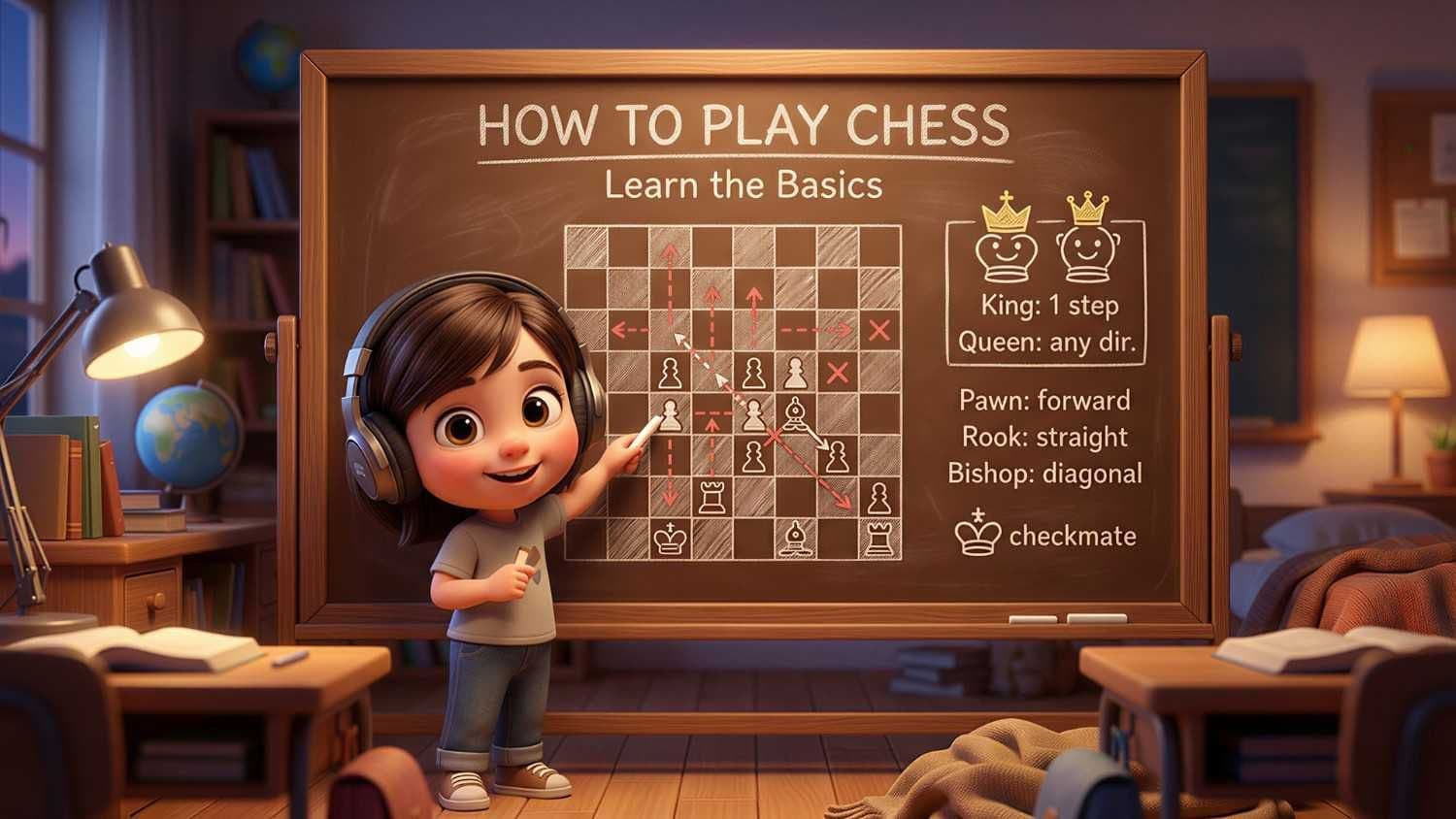8 Chess Strategies for Beginners: Essential Tips to Start Winning

Chess Study Plans – Improve Your Game Step by Step
Discover the ultimate Chess Study Plan to improve fast! Learn structured strategies for beginners to advanced players. Start mastering chess today!

6 Chess Openings for Beginners to Start Strong
Learn simple and effective chess openings to start your game right. Perfect for beginners!

How To Get Better At Chess - Step-by-Step Guide
Discover how to get better at chess with practical strategies, exercises, and expert tips. Start improving your chess skills today and win more games.

Perfect Chess Board Set-Up Beginners Guide To Follow
Setting up a chess board correctly is crucial! Learn the official rules, avoid common mistakes, and start playing like a pro. Learn now!

How Chess Pieces Move: A Simple Guide for Beginners
Understand how chess pieces move with easy explanations for beginners. Learn the rules, roles, and movements of every piece on the board.

Suppose you are going to play your first game of chess. You are looking at the board and 32 pieces stare at you, and you ask yourself: "Where do I begin? Your hands hover over pieces. Should you move the knight? Push a pawn? Attack immediately?
It is quite natural that this may be confusing. However, this is the key that makes the difference between victorious players and constant losers: they do not make random moves. They follow a plan. You can keep playing chess online again and again to improve your skills.
Chess strategy is the plan. It is the long-run plan on which your pieces are headed to success, not fancy maneuvers and involved combinations, but sound principles that even the greatest are not above.
Regardless of whether you are a beginner or simply desire to score more wins, these beginner chess tactics will change your mental thinking on the chessboard.
FAQs
- For beginners, the strongest strategy is mastering fundamentals: control the board’s center, develop pieces efficiently, and then castle early in order to protect the king. Avoid all aimless moves. Furthermore, think about how each piece supports others, restricting opponent mobility, while creating threats. A clear, coordinated plan beats memorized tricks every time.
- Beginners should concentrate on one or two moves ahead, due to their move and how their opponent will most likely respond. Anticipate threats, strategize unsophisticated responses, and not rush into action. Many things become clearer with experience, yet initial success is achieved by discovery of patterns together with consequences instead of long-term calculations. The thing is high-quality thinking wins over quantity in the beginning.
- Memorizing openings is really important for beginners. Instead, they should understand why moves actually work occupy the center, develop efficiently and protect the king. When beginners understand the “why”, it allows adaptability in any positions, teaches strategic thinking, and prevents over-reliance on the rote sequences that can even fail when opponents deviate from standard lines.
- Beginners often make moves with no purpose even at all, overextend pawns, or even place the king in danger. When one ignores the threats made by the opponents or even ignores the development, the result is a loss of material and weak positioning. By working on the piece coordination, thinking ahead, acting on important squares, one avoids making early mistakes and creates a strong framework to continue making further advances.
- In order to move fast, combine practical play with reflection: play slower games, review mistakes, solve tactical puzzles on a daily basis, and study piece activity, pawn structure, along with king safety. Also, focus on understanding patterns, not memorization. Learning your own games and correcting recurring errors can truly accelerate strategic growth effectively.

Chess Study Plans – Improve Your Game Step by Step
Discover the ultimate Chess Study Plan to improve fast! Learn structured strategies for beginners to advanced players. Start mastering chess today!

6 Chess Openings for Beginners to Start Strong
Learn simple and effective chess openings to start your game right. Perfect for beginners!

How To Get Better At Chess - Step-by-Step Guide
Discover how to get better at chess with practical strategies, exercises, and expert tips. Start improving your chess skills today and win more games.

Perfect Chess Board Set-Up Beginners Guide To Follow
Setting up a chess board correctly is crucial! Learn the official rules, avoid common mistakes, and start playing like a pro. Learn now!

How Chess Pieces Move: A Simple Guide for Beginners
Understand how chess pieces move with easy explanations for beginners. Learn the rules, roles, and movements of every piece on the board.






